


|
|
|
I am going for a couple of days to Panchgani. It should revive old memories of schooldays. The route then was always via Pune (then known as Poona), the Mahad road was still to be constructed. The 7.20 Pune Express from VT, parents handing over charge to teachers, new boys trying not to cry. The month would be January, the next home holiday would be in September, a long time away. The garlands and coconuts that fond parents would have given, would be cast in the Thane creek, the school�s fast bowlers throwing them farthest. Then on to Pune, where buses would be waiting to take the boys over the Shirwal and Wai ghats to Panchgani.
The morning after arrival in school was marked for the mass purgative, two large spoons of greasy castor oil, or a glass of a foul white liquid called Alba, you had a choice. And no breakfast, to allow the purgative to work efficiently.
There was a short cut up to the Table Land, and a shorter cut down. I would roll down in three minutes flat, as the school�s dynamo would start to throb, pumping out electricity. The lights would come on slowly, first dim, then brightening, but never too bright. Lighting up time was when you felt homesick the most. There was one boy who cried every evening. Not quietly crying in a corner, but loudly, cursing and abusing the whole world around him, spouting venom at the boarding school food that would be served shortly.
In school, we used to celebrate all birthdays, principal, teachers and boys. Though there was nothing fancy about the celebrations, a simple speech repeated by as many boys as possible. The speeches would be made over dinner, Papri-Ma-Gosh and Barela Tareka (burnt and fried) Cutlets. As we tried to fill our stomachs with as many Chapattis as possible (since the main dishes were rationed), there would be a sudden banging of the table in some corner, and a little boy would pop up amid applause and deliver his speech. He would be followed by other little boys from other corners of the hall delivering the same speech verbatim.
More details. Each boy had five or six close friends. Some of the boys had more than this number, like the school captain, for instance � you can imagine. And, most of the time, there were different captains for cricket, hockey and football. Also, you may imagine how many boys would make their speeches on the principal�s birthday, in order to keep in his good books, etc. So, dinner times, were a long procession of speeches. It would be an unusual day when there were no birthdays. I think I can still recall the speech, in toto. Here�s D. P. Billimoria, Sr., reciting it, on Parvezji Jamshedji Saher�s birthday.
|

Home Page
About the mag
Subscribe
Advertise
Contact Us

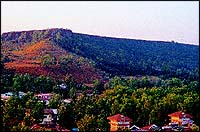 Oh! To be In Boarding School!
Oh! To be In Boarding School!
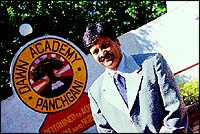 It was a little like going to prison, I am sorry to say. I never got adjusted to living in a boarding school, but I also did not like the idea of staying at home and being a day-scholar in some Jesuit school. When the mud along the roadside turned red, we knew that we were approaching Panchgani. First, the Sidney Point, where the Maratha lookouts stood, watching the valley for the approach of the Mughal armies, then the stone building of the school, set among a circle of tall Silver Oaks.
It was a little like going to prison, I am sorry to say. I never got adjusted to living in a boarding school, but I also did not like the idea of staying at home and being a day-scholar in some Jesuit school. When the mud along the roadside turned red, we knew that we were approaching Panchgani. First, the Sidney Point, where the Maratha lookouts stood, watching the valley for the approach of the Mughal armies, then the stone building of the school, set among a circle of tall Silver Oaks.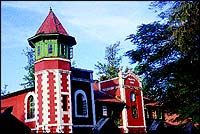 As in all boarding schools, there was an amount of regimentation. The rising bell that woke you up on cold shivering mornings, like at a penal settlement. The tea bell, the study bell, the prayers bell, the breakfast bell, the school bell. Life revolved around one loud brass bell, kept outside the principal�s office. And the chores never ceased. When you were not studying in the classrooms or in the study, you were playing games on the wet Table Land, trying to avoid a rain-heavy football from being kicked into your stomach by a school toughie.
As in all boarding schools, there was an amount of regimentation. The rising bell that woke you up on cold shivering mornings, like at a penal settlement. The tea bell, the study bell, the prayers bell, the breakfast bell, the school bell. Life revolved around one loud brass bell, kept outside the principal�s office. And the chores never ceased. When you were not studying in the classrooms or in the study, you were playing games on the wet Table Land, trying to avoid a rain-heavy football from being kicked into your stomach by a school toughie.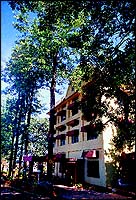 The food was not bad, except that it was served by rote. If it was Tuesday, it was Mutton Cutlet, Spinach and Chapatti. And no dessert. Dessert was served on Mondays, Wed-nesdays, Fridays and Saturdays.
The food was not bad, except that it was served by rote. If it was Tuesday, it was Mutton Cutlet, Spinach and Chapatti. And no dessert. Dessert was served on Mondays, Wed-nesdays, Fridays and Saturdays.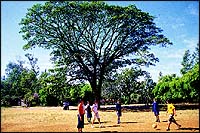 That would be the sum total of the celebration. Next day, another birthday, same speech.
Who started this tradition, I am not aware. Who was the pioneering boy to have composed and delivered the speech, I cannot say. But it was there when I first went to the school, and it remained long after I left the school. It is probably still there.
That would be the sum total of the celebration. Next day, another birthday, same speech.
Who started this tradition, I am not aware. Who was the pioneering boy to have composed and delivered the speech, I cannot say. But it was there when I first went to the school, and it remained long after I left the school. It is probably still there. �Dear principal, teachers and boys, I rise on this occasion to wish my friend, Pesi Sodawaterwalla, a very happy and prosperous birthday. May he live healthy and long. And with these few words, I beg to resume my seat.� (Much applause, unless the boy was particularly unpopular.)
And every morning we would get up and count; how many days left to return home, 218, 217, 142,
141, only 17 days to go.
Finally, I would come home.
And then won-der what was so great about home that I wanted to return.
�Dear principal, teachers and boys, I rise on this occasion to wish my friend, Pesi Sodawaterwalla, a very happy and prosperous birthday. May he live healthy and long. And with these few words, I beg to resume my seat.� (Much applause, unless the boy was particularly unpopular.)
And every morning we would get up and count; how many days left to return home, 218, 217, 142,
141, only 17 days to go.
Finally, I would come home.
And then won-der what was so great about home that I wanted to return.